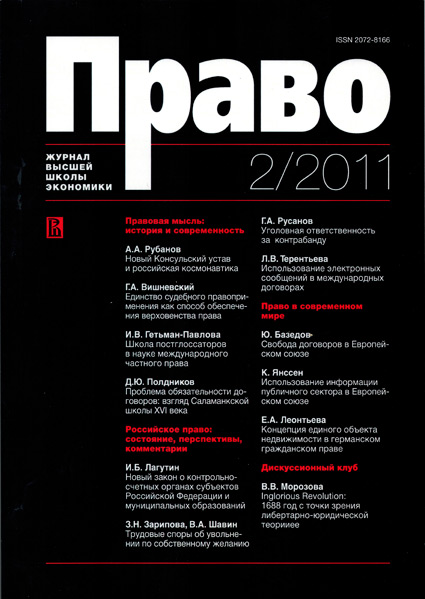Школа постглоссаторов в науке международного частного права
Аннотация
В статье дается общий обзор роли школы постглоссаторов в становлении науки международного частного права. Подчеркивается, что среди источников МЧП доктрина права всегда занимала особое место; как источник МЧП доктрина появилась на несколько столетий раньше национального закона. Начало науки МЧП было положено в конце XII–XIII вв. представителями школы глоссаторов. Знаменитая глосса «о болонце в Модене» стала первой постановкой коллизионных проблем, колыбелью науки МЧП. Однако в полной мере доктрина МЧП начала развиваться в конце XIII–XIV вв., и ее родоначальниками можно считать ученых – представителей школы постглоссаторов (комментаторов, консилиаторов), в трудах которых впервые подверглись научному осмыслению и изучению вопросы столкновений городских статутов – говоря современным языком, коллизии разнонациональных законов. Признанным основателем МЧП как науки и как практической доктрины считается Бартоло да Сассоферрато, однако его труды появились не на пустом месте, и в вопросах коллизии законов у него было много предшественников. Среди них необходимо назвать Вильгельма Дурантиса, Жака де Равиньи, Пьера Бельперша, Чино да Пистойя, Альберика да Рошате и Жана Фабера. Эти ученые сформулировали коллизионные принципы, закрепленные в современном законодательстве, и благодаря им применение иностранного права впервые было признано правовой обязанностью государства. При этом никто из постглоссаторов – предшественников Бартоло – не смог предложить какой-либо теории конфликтного права. Однако такое положение вещей естественно для первой половины XIV в. – коллизионные вопросы имели практическую, житейскую значимость, но судебная практика в этом отношении была крайне скудна, а правители (законодатели) и вовсе не интересовались регулированием частных отношений, связанных с иностранным правопорядком. Вопросы конфликтов разнонациональных законов еще не были настолько актуальны и востребованы, чтобы пробудить теоретическую мысль, привести к формулированию обобщений и принципов. Школу постглоссаторов характеризуют сосредоточенность на противоречиях и пробелах в праве, на диалектических проблемах, стремление решить их с помощью обобщения правовых принципов и понятий. В этой школе всецело соблюдались те ценности, которые характеризуют науку в целом: объективность, честность, универсализм, скептицизм, терпимость к ошибке, скромность, открытость для новой истины.
Copyright (c) 2011 Право. Журнал Высшей школы экономики

Это произведение доступно по лицензии Creative Commons «Attribution-ShareAlike» («Атрибуция — На тех же условиях») 4.0 Всемирная.


















